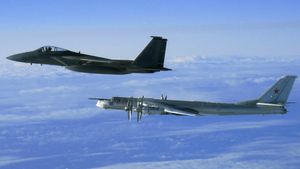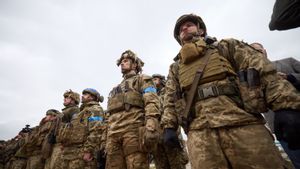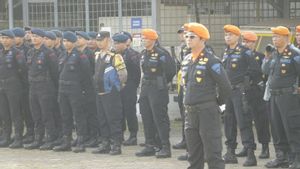JAKARTA - Seif al-Adel, a former Egyptian special forces officer and top member of al Qaeda, is the de facto leader of the group according to the latest United Nations (UN) report.
Born in Egypt on April 11, 1960, he is on the FBI's wanted list, with a $10 million reward for information that could assist in his arrest.
Al Qaeda has yet to formally appoint a replacement for Ayman al-Zawahiri, who is believed to have been killed in a US missile strike in Kabul last year, dealing a blow to the organization since its founder Osama bin Laden was killed in 2011.
Although a US intelligence official said in January that Zawahiri's succession remained unclear, a UN report assessing the risk of the group said: "In discussions in November and December, many member states took the view that Seif al-Adel was already operating de facto and undisputed leader of the group."
Zawahiri's death adds to the pressure on the group to elect a strategic leader, who can carefully plan deadly operations and run jihadist networks, al Qaeda experts say.
Unlike his predecessors who maintained a high profile by broadcasting fiery videos around the world threatening the United States, experts say Adel planned the attack from the shadows, as he helped turn al Qaeda into the world's deadliest militant group.
Adel was indicted in November 1998 by a US federal grand jury for his role in the bomb attacks on the US Embassies in Tanzania and Kenya that killed 224 civilians and wounded more than 5,000.
Outside of operations in Africa, his training camps, and links to the killing of US journalist Daniel Pearl in Pakistan in 2002, according to US investigators, little is known about Adel.
The US State Department says Adel is based in Iran. The department's Rewards for Justice program is also offering up to $10 million for information on Adel, who it says is a member of al Qaeda's "leadership council" and heads the organization's military committee.
The program's website says. After the African bombing, the former Egyptian army lieutenant colonel moved to southeastern Iran, where he lived under the protection of the country's Iranian Revolutionary Guard Corps (IRGC).
He and other Al Qaeda leaders were placed under house arrest in April 2003 by Iran, which later released him and four others in exchange for an Iranian diplomat kidnapped in Yemen.
In a message posted on Twitter on Wednesday, the Iranian mission to the United Nations denied Adel was in Iran.

"It should be noted that the address of the so-called newly appointed Al-Qaeda leader is wrong. This misinformation has the potential to hinder efforts to fight terrorism," he said, launching Reuters on February 16.
Ali Soufan, a former FBI special agent who tracks al Qaeda operations, wrote in a profile carried by the Center for Combating Terrorism, Adel was smart with a poker face.
"However, his temper also became known. Possessing a 'hot tongue,' he tended to threaten violence against anyone who displeased him, and was known to meet disloyalty with swift and ruthless force," wrote Soufan.
"With underlings, he could be insulting, even brutal, in the heat of the moment. But he was also a known fount of unsavory advice. In happier times he showed a flair for football and a penchant for practical jokes," he explains.
Once the head of Osama bin Laden's bodyguard and a senior trainer of militants, jihadi movement experts say Adel began his long, bloody career in 1981, when he was suspected of involvement in the assassination of Egyptian President Anwar al-Sadat during a televised military parade in Cairo.
Adel earned more credentials after he joined other Arab militants against the Soviet occupying forces in Afghanistan, where he eventually led a training camp before becoming a senior figure at al Qaeda.
"Seif al-Adel's professional military background and valuable experience as head of al Qeada's military committee prior to 9/11, meant he had strong credentials to take over the leadership of al Qaeda as a whole," said Elisabeth Kendall, a jihadist expert at the University of Oxford.
He took control of al Qaeda which had become highly decentralized since the group carried out its most spectacular operation, the September 11, 2001, plane attack on the United States that killed nearly 3,000 people.
Adel, one of al Qaeda's few remaining old guard, has been close to central command for decades, experts say. He will be tasked with providing strategic guidance to widely dispersed networks in the Middle East, Africa, and Asia that run their own day-to-day affairs.
Some questioned whether Adel could be an effective organizational leader, having spent most of his career as an operator and trainer in militant camps.
"Many insiders argue that he has had important operational roles in the past, but he is not equipped for leadership," said Jerome Drevon, senior analyst with Jihad and Modern Conflict at the International Crisis Group.
"His expertise is more suited to the organization of armed operations, rather than the administration of an extensive network of affiliates."
One of al Qaeda's foremost military leaders and often referred to by experts as its third official, Adel set up training camps for the organization in Sudan, Pakistan, and Afghanistan in the 1990s.
VOIR éGALEMENT:
He also played a role in the ambush of US helicopters in Mogadishu, known as the "Black Hawk Down" incident in 1993 which killed 18 US servicemen, security experts say. It marked the beginning of the withdrawal of UN peacekeepers from Somalia.
It is known, the FBI identified Adel as one of the most wanted terrorists and accused him of conspiring to kill US citizens, kill and destroy buildings.
"She (Adel) is a very brave, professional, cold-blooded person," said Yoram Schweitzer, head of the Terrorism and Low-Intensity Conflict Program at Tel Aviv University's Institute of National Security Studies.
The English, Chinese, Japanese, Arabic, and French versions are automatically generated by the AI. So there may still be inaccuracies in translating, please always see Indonesian as our main language. (system supported by DigitalSiber.id)


















